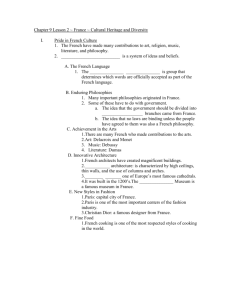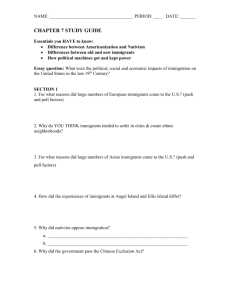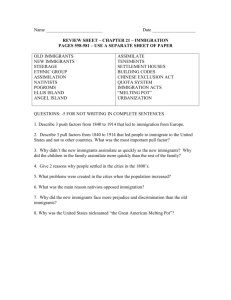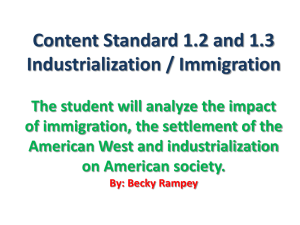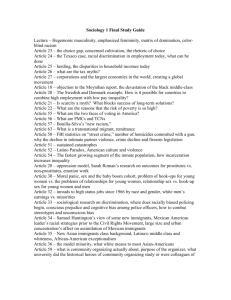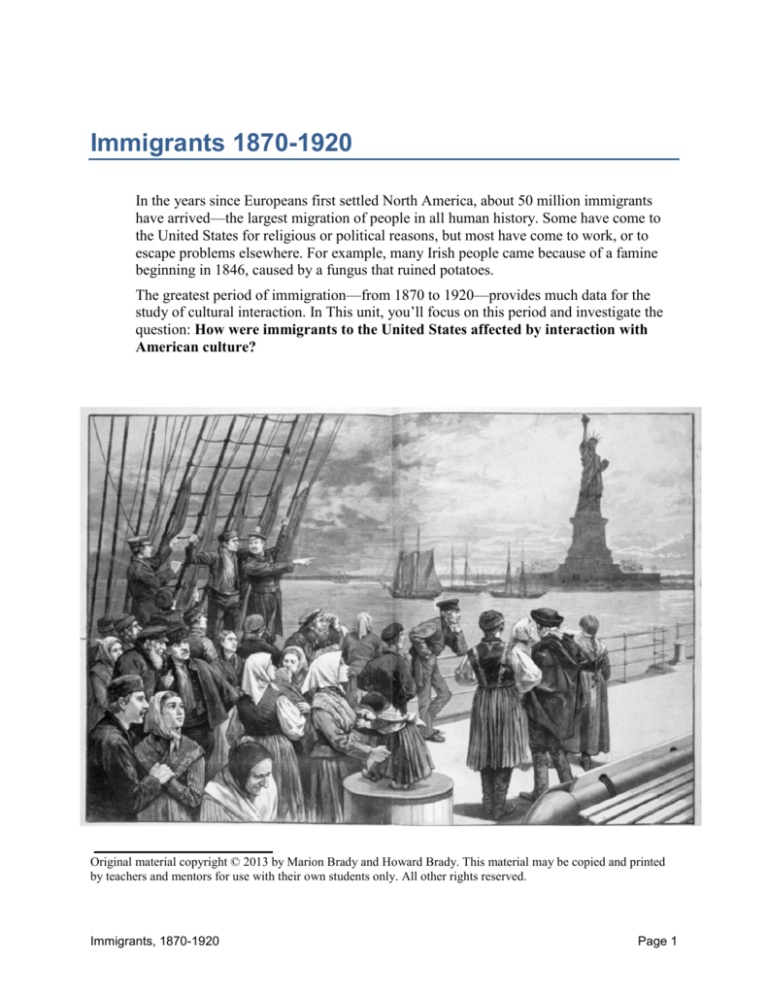
Immigrants 1870-1920
In the years since Europeans first settled North America, about 50 million immigrants
have arrived—the largest migration of people in all human history. Some have come to
the United States for religious or political reasons, but most have come to work, or to
escape problems elsewhere. For example, many Irish people came because of a famine
beginning in 1846, caused by a fungus that ruined potatoes.
The greatest period of immigration—from 1870 to 1920—provides much data for the
study of cultural interaction. In This unit, you’ll focus on this period and investigate the
question: How were immigrants to the United States affected by interaction with
American culture?
Original material copyright © 2013 by Marion Brady and Howard Brady. This material may be copied and printed
by teachers and mentors for use with their own students only. All other rights reserved.
Immigrants, 1870-1920
Page 1
Investigation: Immigrant Demographics
Select and graph some of the statistics from the table below. Identify the peak
periods of immigration from each region. Identify changes in immigration
patterns over the period covered by the table. In which period was the impact of
immigration likely to have been greatest on American society? Why?
U.S. Immigration 1820 - 1970
1821-1830
1831-1840
1841-1850
1851-1860
1861-1870
1871-1880
1881-1890
1891-1900
1901-1910
1911-1920
1921-1930
1931-1940
1941-1950
1951-1960
1961-1970
Northern
Europe
118,000
700,000
1,600,000
2,400,000
2,014,000
2,038,000
2,778,000
1,600,000
1,800,000
950,000
1,818,000
2,015,000
491,000
931,000
588,000
Eastern Southern
Europe
Europe
40
3,000
650
5,300
650
4,700
1,620
20,000
12,300
21,000
125,000
76,000
625,000
333,000
1,207,000
808,000
3,834,000 2,390,000
1,863,000 1,506,000
575,000
580,000
338,000
84,000
107,000
73,000
123,000
261,000
106,000
421,000
Asia
10
45
80
41,000
65,000
124,000
68,000
71,000
244,000
193,000
97,000
15,000
32,000
153,000
478,000
The
Americas Africa
11,000
20
33,000
50
62,000
55
74,000
210
169,000
310
404,000
450
427,000
850
39,000
370
362,000 7,000
1,143,000 8,400
1,517,000 6,200
160,000 1,750
355,000 6,300
997,000 14,000
1,716,000 29,000
Investigation: Immigrant Cultural Differences
Immigrants, of course, weren’t all alike. Often, even the immigrants from one country
differed in values and attitudes. A farmer and a professor, for example, might have quite
different ideas and ways of acting.
The material that follows shows just some immigrant ideas and ways of acting. This
should help explain cultural interaction taking place.
As you analyze the data in this investigation, identify differences
between ideas and ways of acting of the immigrants and those of
most Americans. Use the categories in your Model for shared ideas
and patterns of action as guidelines for investigation.
Page 2
Immigrants, 1870-1920
In Italy I live in small town—six, seven thousand. It take not much money to live. We
pay the rent once a year, only little money. We have fine garden, we live healthy, happy. I
obey my mother's word, which is like the God. The people in my town, they are serious,
human, good heart. We give everything to the poor. When stranger comes to us, he got
always the first chair; we make all we could for him. The stranger can stay a year; he needs
no money to pay for anything.
We work little bit, then we take the leisure. We love very much the music, art, poetry.
We love the poetical life—poetry today, and tomorrow we take what's coming with the good
patience. The way I mean is not only to read the books of the great poets—of Dante that we
love more than a father, or Petrarca—but the poetry of the beautiful scenery in the country,
the poetry of the music, the poetry of the friendship. Even in the small town we have band
and orchestra.
November 11, 1902
Dearest Parents,
Please do not be angry with me for what I shall write. I write you that it is hard to live
alone, so please find some girl for me. Be sure she is an honest one, for in America there is
not even one single honest Polish girl.
***
December 21, 1902
Dearest Parents,
I thank you kindly for your letter, for it was happy. As to the girl, although I don't
know her, a friend of mine who does says that she is stately and pretty. I believe him, as well
as you, my parents.
Please tell me which of the sisters is to come, the older or the younger one,
Aleksandra or Stanislawa.
(Continued)
Immigrants, 1870-1920
Page 3
This statement was made at a Russian conference in 1905:
The people believe that it is the Tsar's responsibility to govern them, and that he
has no need of advice from the people. They believe that the Tsar thinks about them all the
time, not even sleeping at night out of concern for them. They believe the Tsar should
govern alone, for that is not only his right, it is his heavy burden to bear.
Occasionally in the past the Tsar has asked the people's advice, but when he has the
people have said, “This is what we think, but do what you believe is best.”
I am a son of a Polish peasant farmer. Until ten years of age I did not know the
alphabet, or, exactly speaking, I knew only the letter B. Father did not send me to school.
He was always repeating: “We have grown old, and we can't read nor write, and we live;
so you, my children, will also live without knowledge.”
I said to my father that I wanted to learn from a book. And father scolded me, “And
who will peel potatoes in the winter, and pasture the geese in summer?” I cried. Once,
while peeling potatoes, I escaped from my father and went to an old man who knew not
only how to read, but how to write well. I asked him to show me letters in the printer, and
he did not refuse. I went home and thought: “It is bad! Father will probably give me a
licking.” And so it was. Father showered a few strokes on me and said: “Don't you know
that, as old people say, he who knows written stuff casts himself into hell?” But I used to
steal out to learn more and more frequently.
For the peasant, arson is a way of getting even, and does not bring dishonor in the
eyes of one’s neighbors.
A peasant whom my father scolded for having set fire to his neighbor’s buildings
said, “I have set fire to his barn, but he could have and still can set fire to mine.” I have
listened to the stories of many perfectly respectable farmers who tried to set fire to their
enemies’ farm buildings.
From the previous data choose several ideas, attitudes, or values you think differed from those
of most Americans in the period from 1870 to 1920.
1.
Describe a problem situation which might have been caused by these differences.
2.
If you’ve completed Part 10 of Investigating American History, identify groups
(immigrants and others) which may have experienced lowered autonomy, possible
causes, and possible responses they may have to their situations.
Page 4
Immigrants, 1870-1920
The figures on the following chart come from 1870 immigration records, when 387,203
immigrants entered the United States. About half gave inspectors some information about
the jobs they had held in their homelands.
Based on this data, what general statements can you make about the kinds of work
these immigrants were prepared to do in America? Where would different kinds of
workers be likely to go to live in America?
OCCUPATION OF SOME IMMIGRANTS IN 1870
2,132 Professionals, including
232 doctors
531 engineers
285 clergymen
483 teachers
31,964 skilled workmen, including
2,378 blacksmiths
4,421 carpenters
228 cigar makers
2,190 masons
4,763 miners
505 seamstresses
1,587 shoemakers
1,703 tailors
1,178 weavers
8,061 mechanics
145,782 miscellaneous, including
1,611 clerks
35,656 farmers
84,577 laborers
7,073 merchants
1,420 sailors
14,261 servants
TOTALS:
Professional
Artist
Skilled workman
Miscellaneous
Without occupation
Occupation not stated
2,132
200
31,964
145,782
16,529
190,596
Total immigrants
387,203
Investigation: Responses of Americans to Immigrants
Whenever people with differing ideas and ways of acting come into contact,
misunderstanding and resentment almost always occur. It isn’t surprising, then, that
America had many problems during periods of heavy immigration. The data in this
activity reflect attitudes and feelings toward immigrants.
Read the data and identify:
1.
American opinions about the effects of immigration
2.
Some American ideas about the immigrants themselves.
3.
If you’ve completed Part 10 of Investigating American History, refer to your list of the
stress responses likely to grow out of limited autonomy. Identify examples in the data.
Immigrants, 1870-1920
Page 5
The millions of immigrants pouring into the United States raised the issue of restriction.
In 1881 a Bostonian, Hamilton Andrews Hill, took this position at a conference on
immigration:
I want to call the attention of the conference to this fact, that the evils which have
been pointed out this morning in connection with immigration are but a small part of a
great and marvelous movement of population from the Eastern and Western Hemisphere.
A large majority of those who come as immigrants are valuable additions to our
population and they should be cordially welcomed. They come, many of them, with
money and with tools of industry and with honest purposes. They want to be industrious
citizens, to take care of themselves and their families, and to add to the national wealth.
It is a mistake to talk as though immigrants were a mass of paupers about to
become dependent on us. We must use all the techniques of our Christian civilization in
dealing with these people in order to make Christian citizens of them; do not put a stigma
upon them by calling them paupers and criminals.
In 1885, a Protestant minister, Reverend Josiah Strong, wrote:
The typical immigrant is a European peasant, whose horizon has been narrow,
whose moral and religious training has been little or false, and whose ideas of life are low.
Many belong to the pauper and criminal classes. Every detective in New York knows that
there is scarcely a ship landing immigrants that does not bring English, French, German,
or Italian “crooks.”
Moreover, immigration not only furnishes most of our criminals, it is also
seriously affecting the morals of the native population. It is disease and not health which
is contagious. Most foreigners bring with them European ideas of the Sabbath. The result
is sadly plain in all our cities, where Sunday is being changed from a holy day into a
holiday. But by far the worst threat to morals is the liquor business, and this is mainly
carried on by foreigners. In 1880 63 percent of the traders and dealers in liquors and wines
were foreign-born. Seventy-five percent of the brewers were foreign-born, while a large
part of the remainder were of foreign parentage. Of saloonkeepers, about 60 percent of
these corrupters of youth, whose hand is against every man, were of foreign origin.
We can only glance at the political results of immigration. As we have already
seen, it is immigration which has fattened the liquor power; and there is a liquor vote.
Immigration is the mother and nurse of American socialism; and there will be a socialist
vote. Immigrants go to the cities, and give them their political character. And there is no
more serious threat to our civilization, than our rabble-ruled cities.
Page 6
Immigrants, 1870-1920
David Phillips, in Letters from California (1877):
Take the 70,000 Chinamen out of California, its industries would be ruined, and the
lands, now so productive, would be cultivated without profit. They supply, by their toil,
nearly all the vegetables and much of the poultry. They are doing a large share of the farmwork, and build all the railroads and irrigating canals and ditches. They do much of the
cooking, and nearly all the washing and ironing. It is said they send the money they save
back to China. Why? Because they are not safe, either in person or property, here. Were
they protected as citizens are, they would soon own lands, town lots and houses. As it is
now, the low, the vile, the idle, brutal hoodlum, in San Francisco, and all other large towns
in this State, may attack the Chinaman's house, smash his windows, and break up his
furniture and beat him, and he is—only a Chinaman.
Words of a song published in California in 1877:
Twelve Hundred More
0 workingmen dear, and did you hear
The news that's goin' round?
Another China steamer
Has been landed here in town.
Today I read the papers,
And it grieved my heart full sore
To see upon the title page,
0, just “Twelve Hundred More!”
0, California's coming down,
As you can plainly see.
They are hiring all the Chinamen
and discharging you and me;
But strife will be in every town
Throughout the Pacific shore,
And the cry of old and young shall be,
“0, damn, ‘Twelve Hundred More’”
They run their steamer in at night
Upon our lovely bay;
Immigrants, 1870-1920
If 'twas a free and honest trade,
They'd land it in the day.
They come here by the hundredsThe country is overrunAnd go to work at any priceBy then the labor's done.
Twelve hundred honest laboring men
Thrown out of work today
By the landing of these Chinamen
In San Francisco Bay. . . .
This state of things can never last
In this our golden land,
For soon you'll hear the avenging cry,
“Drive out the China man!”
And then we'll have the stirring times
We had in days of yore,
And the devil take those dirty words
They call “Twelve Hundred More!”
Page 7
Statements made in 1922 by Kenneth L. Roberts:
Races cannot be crossbred without mongrelization, any more than breeds of dogs
can be crossbred without mongrelization. The American nation was founded and developed
by the Nordic race, but if a few more million members of the Alpine, Mediterranean, and
Semitic races are poured among us, the result will be a race of people as worthless as goodfor-nothing mongrels.
A mongrelized race of people cannot produce great artists or statesmen or poets or
sculptors or explorers or warriors. The government of a mongrelized race becomes corrupt,
its art and literature become childish and silly, the courts and judges become unfair, and its
public and private morals go bad. All that is left are tricky and cunning traders and people
who think they are better than they really are. These facts should be interesting to American
citizens. So many millions of non-Nordic aliens have poured into this country since 1880
that several of our largest cities have more foreign-born and children of foreign-born than
native Americans.
Unless this is stopped immediately, mongrelization is inevitable. Many of our
largest cities are beginning to show the effects of mongrelization. Some Americans think
that only snobs believe in racial purity, but race purity is essential for the well-being of our
children. Only if our race remains pure can we keep the things that made America great.
From the San Francisco magazine The Wave, December 1899:
As far as the East is from the West, so far is that silent, obstinate Chinese subcivilization we cherish in our midst from our Caucasian civilization. We have met many
peoples on our spread eastward and westward, and rubbed up against many ideals, but of
them all, the Chinese is the one farthest removed from our ideas. We have had Chinatown
in our midst some fifty years. We have policed it and missionaried it; we have tried, by
every endeavor to extend to it the “blessings” of Occidental ideas. A good third of our
Chinese have never seen China, being born in California, and most of the rest have their
sole business connection in San Francisco, and yet hardly one of them has accepted what
we have to give. They go their own way, live in their own fashion, are governed by their
own laws and laugh ours to scorn. Pass one of them on the street, and he turns out for you
without a glance, as he would turn out for a post.
Page 8
Immigrants, 1870-1920
Both of the cartoons below were drawn by the same artist, the upper one in 1880, the
lower in 1893:
Immigrants, 1870-1920
Page 9
For many years each state made its own laws about admitting immigrants. In 1882,
however, Congress began to take control. Some important regulatory laws are described
below. Use this data to answer the questions that follow.
Restrictions on Immigration
Immigration Act 1882
Imposed a 50 cent head tax on entering immigrants
Excluded criminals, paupers, and the insane.
Chinese Exclusion Act 1882
Excluded Chinese immigrants to the U.S. for 10 years. This act was made permanent in 1904,
but cancelled after World War II.
Gentlemen’s Agreement 1907
Japan voluntarily agreed to limit the immigration of Japanese laborers to the U.S. by refusing to
give applicants a passport.
Literacy Text Act 1917
Immigrants over 16 years of old were required to read and write one foreign language (The
physically handicapped were exempt from this requirement.)
Emergency Quota Act 1921
Established the first immigration quota; set a yearly ceiling of about 357,000 newly entering
immigrants from outside the Western Hemisphere
Restricted the number of new immigrants to 3% of the number of foreign-born persons of that
country in the U.S. in 1910.
Johnson-Reed Act 1924
Set a yearly ceiling of about 160,000 newly entering immigrants from outside the western
hemisphere.
Restricted the number of entering immigrants to 2% of foreign-born persons of that country in
the U.S. in 1890.
National Origins Act 1929
Set a yearly ceiling of about 150,000 newly entering immigrants from outside the western
hemisphere
Based origins quota on foreign-born population in the U.S. in 1920.
Said no one country could have a quota of less than 100.
Page 10
Immigrants, 1870-1920
Effects of the Quota Laws:
Average inflow of immigrants
each year, 1907-1914:
Quotas under
the Act of 1921:
Quotas under
the Act of 1924:
Quotas under
the Act of 1929:
Immigrants from Northern and
western Europe
Immigrants from all other
countries (mainly from southern
and eastern Europe)
117,000
714,000
204,365
152,660
144,131
21,536
128,660
25,854
The laws passed by Congress usually reflect the attitudes of a majority of the people in
the United States. What attitudes toward immigrants are indicated by the immigration
laws? What kinds of people are favored by the laws?
What effect do you think each of the following might have on American attitudes
toward immigrants? Explain.
More available jobs than workers
More available workers than jobs
Surplus undeveloped land in the West
Most immigrants of Protestant religion
Most immigrants Catholic or Jewish
In your opinion, which American objections to immigrants were reasonable? Which
were based on racism and prejudice?
NOTE: Many additional immigration laws and changes to existing laws have been enacted since
1929; additional changes are likely. See:
http://library.uwb.edu/guides/usimmigration/USimmigrationlegislation.html
Immigrants, 1870-1920
Page 11
Investigation: Immigrant Problems
For most immigrants, coming to America presented major problems. Arrangements had
to be made for someone else to take over family responsibilities, separating from friends
and family was difficult, and leaving for an unknown place was surely a little frightening.
The trip to a port, the wait for a ship, and the ocean crossing could take weeks or even
months, and could also be very expensive.
Most immigrants' problems didn't end with arrival in America. Analyze the following
data. Identify the many different kinds of problems immigrants faced. If you’ve
completed Part 10 of Investigating American History, identify the ways that the
person’s autonomy is being affected by the problem.
After two days of being a guest, I was politely given to understand that it was time for
me to enter the race for American dollars. For the rest of that week and all through the next I
went out looking for work. Early in the morning I would get one of the children to translate
the "Help Wanted" advertisements for me. When I glanced at the length and number of those
columns, I saw that I would soon be rich. There were hundreds of shops and factories and
offices, it seemed, that wanted my help. They literally begged me to come. They promised me
high wages and fine working conditions.
And then I would go and blunder around for hours, trying to find where they were,
stand in line with a hundred other applicants, approach timidly when my turn came, and be
passed up with a long look at my appearance.
Somehow, I was always refused. Why? At last one morning, a butcher in the upper
Eighties in Manhattan gave me the answer. I had got there before anyone else, and when I saw
that he was going to pass me up, I got up all my courage and asked him the reason. He looked
me over from head to foot, and then, with scornful glance at my shabby foreign shoes he
asked me if I thought he wanted a "greenhorn" working in his store.
I thought about that for a long time. Here indeed was a new light on America. Her road
to success was a vicious circle. In order to get a job I needed American clothes, and the only
way to afford American clothes was to get a job.
Page 12
Immigrants, 1870-1920
A former sailor described his first job in America:
One morning Louis and I were standing with some other men on the sidewalk, and a
fat man came toward us. "Good morning, padrone," said one of the men.
"Padrone?" said I to myself. Now the word padrone in Italy is used only about a man
of some importance. This man not only showed no signs of good breeding, he was unshaven
and dirty and his clothes were shabby. I could not understand why he would be called
padrone. However, I said nothing, because I wanted to be polite when I was in American
society.
The padrone began to describe in glowing words the advantage of a certain job: "It is
not very far, only 12 miles from Boston. For a few cents you can come back any time you
wish to see your friends and relatives. The company has a 'shantee' in which you can sleep,
and a 'storo' where you can buy your 'grosserie' very cheap. Good pay," he continued, "$1.25
per day, and you only have to pay me 50 cents a week for getting you this good job. I only do
it to help you and because you are my countrymen. If you come back here at six o'clock
tonight, I will take you out."
The generosity of this man impressed Louis and me very much. We decided we
would go, so at six o'clock we returned to the very spot. About 20 men were there and we
were led to North Station. We took a train to some suburban place I've never learned the
name of.
On reaching our destination we were taken to the shanty and shown two long shelves
filled with straw. These were our beds. The store of which we had been told was at one end
of the shanty. The next morning we were taken out to work.
It was a warm autumn day. The pick seemed to grow heavier with every stroke and
the shovel wider and longer. The second day was no better than the first, and the third was
worse than the second. It was especially hard for Louis and me, for we had never been farm
workers like the rest. The padrone, whose generosity had so impressed us was little better
than a brute. We began to do some simple figuring and discovered that when we had paid for
our groceries at the store, for the privilege of sleeping in the shanty, and the 50 cents to the
padrone for having been so kind as to hire us, we would have nothing at the end of the week
but sore arms and backs. On the afternoon of the third day, Louis and I had a meeting and
decided to part company with picks and shovels forever. We left, without receiving a cent of
pay, of course.
Immigrants, 1870-1920
Page 13
This letter appeared in the Jewish Daily Forward, a New York newspaper:
Dear Mr. Editor,
I was born in a small town in Russia, and until I was 16 I studied in Hebrew schools,
but when I came to America I changed quickly. I was influenced by the progressive
newspapers and the literature. I developed spiritually and became a free-thinker. I meet with
free-thinking, progressive people, I feel comfortable in their company, and I agree with their
convictions.
But the nature of my feelings is remarkable. Listen to me: Every year when the
month of Elul rolls around, when the time of Rosh Hashanah and Yom Kippur approaches,
my heart grows heavy and sad. A melancholy descends on me, a longing gnaws at my
breast. At that time I cannot rest, I wander about through the streets, lost in thought,
depressed.
Your reader, S. R.
A young immigrant girl wrote to her aunt in Europe:
Dear Auntie:
I received your letter on February 20 and I write you on February 25. Dear auntie, I
inform you that I am in the same place working for an English-speaking master and mistress
who don't know a word of Polish, and I don't know English; so we communicate with
gestures and I know what to do, that's all. I know the work and therefore I don't mind much
about the language. But, dear auntie, 1 went intentionally into an English household in order
that I may learn to speak English, because it is necessary in America. I am in good health,
only I am a little ill with my feet. I don't know what it is, whether rheumatism or something
else. I walk very much, because from six o'clock in the morning till ten o'clock in the
evening I have work and I receive 22 dollars a month, and I have seven persons, and 16
rooms to clean, and I cook. Everything is on my head.
O dear auntie, I write you that I have nothing to write, only I ask you for a quick
answer. I wish you a merry holiday of Easter time. O dear God, why cannot I be with my
auntie and divide the egg together with parents and brothers and sisters! When I think about
all this, I would not be sorry if I had to die right now.
Which of the problems you've identified do you think are usually present when unlike
cultures come in contact?
Page 64 of Investigating American History has a graph showing economic conditions.
Identify possible relationships between these conditions and attitudes toward
immigrants.
Keywords for further investigation: Ellis Island, Central Pacific Railroad, Statue of
Liberty, Irish Potato Famine, Japanese-American Internment.
Page 14
Immigrants, 1870-1920
Investigation: Immigrant Responses to Problems
By 1900 state commissions and charities had begun to aid immigrants in some matters,
but in general there was little organized effort to help newcomers settle in the United
States. Most had to solve the problems of daily life by themselves. The following
material provides information about some of the ways immigrants coped.
As you study the data, identify actions you think helped immigrants solve some of their
problems, and the possible effects of these actions on the immigrants. If you’ve
completed Part 10 of Investigating American History, identify situations in which
autonomy is lacking, and the kind of response being made.
Origin of occupants of apartments in New York City, early 1900's:
Rose Cohen, from a Jewish immigrant family, described her father's actions:
I found that father was already at home. As I came into the room I saw him resting
against the wall, clipping his beard. I was so surprised and shocked to see him actually do
this thing that I could neither speak nor move for some minutes. And I knew that he, too, felt
embarrassed. After the first glance I kept my eyes steadily on the floor in front of me, and
began to talk to him quietly, but with great earnestness: “You had been so religious in the old
country, father,” I said, “more religious than anyone else in our whole neighborhood. And
now you are cutting your beard. Grandmother would never have believed it. How she would
weep!” The snipping of the scissors still went on. But I knew by the sound that now he was
only making a pretense at cutting. At last he laid it down and said in a tone that was bitter yet
quiet: “They do not like Jews on Cherry Street.”
Immigrants, 1870-1920
Page 15
A list of the organizations connected with one Catholic Church parish in a Chicago
neighborhood settled by Polish immigrants:
Zuaves of St. Stanislaw Kostka; Society of the Virgins of the Holy Rosary; Brotherhood of the Young Men of St.
Joseph; Citizens' Club of Thaddeus Kosciuszko; Theater and Dramatic Club; the Parochial School; the Parish Committee;
the Association of Altar Boys; the Marshals of the Upper Church; the Marshals of the Lower Church; the Arch-sorority of
the Immaculate Heart of Mary (two groups); the Women of the Holy Rosary (four groups); the Arch-brotherhood of the
Saints; the Third Order of St. Francis; the Choirs of the Upper Church; the Choirs of the Lower Church; the Club of
Ladies of Queen Labrowska; the Society of the Alumni of the Parish School; the Musical and Literary Society of Leo
XIII; the Needlework Club of St. Rose of Lima; the Polish Roman Catholic Union (central office), plus 20 additional
affiliates of the Roman Catholic Union; the Polish Alma Mater (central office), plus six additional affiliates of the Alma
Mater; the Court of Pulaski (No. 482 of the Union of Catholic Foresters), plus nine additional units of the Catholic
Foresters; the Society of the Guardianship of St. Joseph (Group 115 of the Polish Association in America), plus six
additional units of the Polish Association; the Society of Young Men of St. Kazimierz (Independent Mutual Help
Association); the Society of Ladies of Queen Jadwiga (Mutual Help Association); the Loan and Savings Association of St.
Joseph No. 3; the Building Loan and Savings Association of Pulaski; the Building Loan and Savings Association of St.
Francis; the Press Committee; the College of St. Stanislaw Kostka; the Novice's Convent of the Resurrectionists; the
Convent of the Sisters of St. Francis; the Chicago Daily News (Polish).
Note: For more primary data, check the Internet: The Library of Congress, American Memory
section.
In 1876, Mary Cone, from Ohio, published Two Years in California. She described
Chinese living in San Francisco:
There are six Chinese companies in San Francisco, each having its own
organization, its own officers, and its own place of meeting. These are in some sense
mutual aid societies. Chinamen can do as they please about joining them, but so great are
the advantages of doing so that almost every one connects himself with one or another. The
initiation fee is from five to ten dollars. There are some incidental expenses, so that the
entire cost of membership for ten years is from fifty to one hundred dollars. A member may
dissolve his connection with the company to which he belongs at his pleasure. In return for
what the member pays, the company take care of him if sick, rescue him, if possible, when
in danger, and feed him when he is out of employment. No matter where he goes, or how
far away, his company is still bound to care for him. If he is oppressed or wronged in any
way, and makes complaint, he must be looked after and his wrongs righted. When a
member wishes to return to China, a certain number of days before he expects to start he
must report himself to the company to which he belongs and state his intention. The books
of the company are searched to see if he owes any man anything; notice is also sent to the
other companies to learn if there is anything against him on their records, and he must have
a clearance before he can leave the country. It is the custom, therefore, if a Chinaman owes
a debt, and there is any difficulty in collecting it, to send notice to the company of which he
is a member, who see that he pays it, at least before he leaves the State. Each company has
a hospital for the benefit of its members, and some of them have temples for religious
service.
Note: Chinese “Tong” companies later developed reputations different from that depicted here.
See http://foundsf.org/index.php?title=The_Tongs_of_Chinatown
Page 16
Immigrants, 1870-1920
Experiences of a young Italian immigrant, who came to the U.S. in 1902:
We went one day to Newark and got work on the street. We paid a man five dollars
each for getting us the work and we were with that boss for six months. He was Irish, but a
good man and he gave us our money every Saturday night. When the work was done we
each had nearly 200 dollars saved. Plenty of the men spoke English and they taught us, and
we taught them to read and write.
We got up at half-past five o'clock every morning, and had a breakfast of bread and
cheese, onions, garlic, and red herrings. We went to work at seven o'clock and in the middle
of the day we had soup and bread in a place where we got it for two cents a plate. In the
evenings we had a good dinner with meat of some kind and potatoes. We got from the
butcher the meat that other people would not buy because they said it was old, but they
don't know what is good.
When the Newark boss told us that there was no more work, Francesco and I talked
about what we would do and we went back to Brooklyn to a saloon near Hamilton Ferry
where we got a job cleaning it out and slept in a little room upstairs. There was a bootblack
named Michael on the corner and when I had time I helped him and learned the business.
Francesco cooked the lunch in the saloon and he, too, worked for the bootblack and we
were soon able to make the best polish.
Then we thought we would go into business and we got a basement on Hamilton
Avenue, near the Ferry, and put four chairs in it. We paid 75 dollars for the chairs and all
the other things. Outside we had a big sign that said:
THE BEST SHINE FOR TEN CENTS
Men that did not want to pay ten cents could get a good shine for five cents, but it
was not an oil shine. We had two boys helping us and paid each of them 50 cents a day.
The rent of the place was 20 dollars a month, so the expenses were very great, but we made
money from the beginning. We slept in the basement, but got our meals in the saloon till we
could put a stove in our place, and then Francesco cooked for us all. That would not do,
though, because some of our customers said that they did not like to smell garlic and onions
and red herrings. I thought that was strange, but we had to do what the customers said.
We had said that when we saved 1,000 dollars each we would go back to Italy and
buy a farm, but now that the time is coming we are so busy and making so much more
money that we think we will stay. We have opened another parlor near South Ferry.
We have joined a club and have much pleasure in the evenings. We meet many
people and are learning new things all the time. We were very ignorant when we came here,
but now we have learned much.
(Continued)
Immigrants, 1870-1920
Page 17
On Sundays we get a horse and carriage from the grocer and go down to Coney
Island. We go to the theaters often, and other evenings we go to the houses of our friends and
play cards.
I am now 19 years of age and have 700 dollars saved. Francesco is 21 and has about
900 dollars. We shall open some more parlors soon. I know an Italian who was a bootblack
ten years ago and now bosses bootblacks all over the city. He has so much money that if it
was turned into gold it would weigh more than himself.
Francesco and I have a room to ourselves and some people call us "swells." Francesco
bought a gold watch with a gold chain as thick as his thumb. He is a very handsome fellow
and I think he likes a young lady that he met at a picnic out at Ridgewood.
I often think of Ciguciano and Teresa. He is a good man, one in a thousand, and she
was very beautiful. Maybe I shall write to them about coming to this country.
Follow-Up: Ethnicity Here and Now
1.
Identify the immigrant society that’s most important to you.
2.
Use the Model categories to gather information about the present-day culture
(ethnicity) of people who originated with the immigrant group you’ve identified.
3.
Summarize the present-day differences between people with origins in this immigrant
group, and the culture of the majority of American people.
Page 18
Immigrants, 1870-1920
Acknowledgements/Sources:
Page 3t: Emily F. Robbins, "If One Speak Bad of Your Mother, How You Feel?," Red Cross Magazine,
September 1919. 3c: Thomas and Znaniecki, The Polish Peasant in Europe and America (New York:
Octagon Books, 1971) v. ii, P 259.. 4t: N. M. Pavlov, Stenographic Report of the Peterhof Conference,
1905 4c: Thomas and Znaniecki, op. cit. v. iv, p. 119. 4b: Thomas and Znaniecki, op. cit. v. iv, p. 119 6t:
F. B. Sanborn, ed, Proceedings of the Eighth Annual Conference of Charities and Correction, 1881. 6b:
Josiah Strong, Our Country, 1891. 7t: David Phillips, Letters from California, 1877, pp. 134-135.
Internet: Library of Congress Learning Page, Rise of Industrial America, 1876-1900, Chinese
Immigration to the United States. 7b: The Blue and Grey Songster, 1877. 8t: Kenneth L. Roberts, Why
Europe Leaves Home (Indianapolis, Ind. The Bobbs Merrill Co, Inc., 1949,) p. 113-114, originally
published 1922. 8b: The Wave, v. 20, July-Dec. 1899: no. 30, page 4: Highbinders and Tong Wars 12:
Abridged and adapted from pp 91-92 in An American in the Making by M. E. Ravage. Copyright 1917
by Harper & Row, Publishers, Inc. 13: Constantine M. Panunzio, The Soul of an Immigrant (New York:
Macmillan, 1921), pp. 79-80 14b: Thomas and Znaniecki, op. cit. v. iv pp. 254-255. 16b: Mary Cone,
Two Years in California, 1876, p. 187. Internet: Library of Congress Learning Page, Rise of Industrial
America, 1876-1900, Chinese Immigration to the United States.17-18: "Autobiography of a
Bootblack," Independent Magazine, Vol. 54.
Notes for teachers and mentors:
In conceptual and historical sequence, this unit follows Part 10 of Investigating American
History. It provides opportunity to apply both the Model and the principles associated
with thwarted autonomy.
Facing problems such as finding employment and assimilation, immigrants rather
naturally turned to others like them for mutual support, moving into a neighborhood of
people with the same area of origin, and forming groups such as Chinese mutual-aid
group, or the many organizations associated with a Polish Catholic Church. The idea that
the United States is a “melting pot” is an oversimplification of a complex reality.
The “standard” shared values and action patterns of Americans generally operate without
being thought about much by most members of our society, until they come into contrast
with those of people from another society. This unit provides that opportunity to not only
figure out the cultural characteristics of people from elsewhere, but also, by seeing
differences, to figure out the characteristics of our own society and culture. A worthy
additional activity would be to encourage learners to begin generating a list of those
“standard” shared ideas and action patterns. (There’s a list of dominant shared ideas of
Americans in Appendix B of Investigating American History, TE.)
Immigrants, 1870-1920
Page 19




